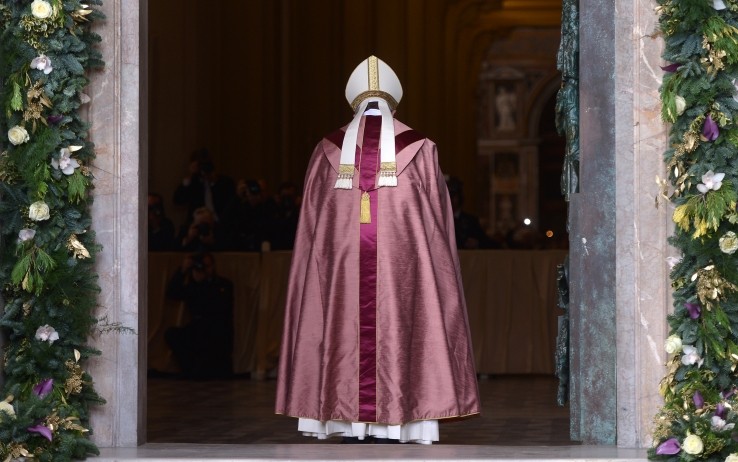Homily of his holiness Pope Francis: Holy Mass and opening of the Holy Door - Basilica of S. John Lateran

EXTRAORDINARY JUBILEE OF MERCY
HOLY MASS AND OPENING OF THE HOLY DOOR - BASILICA OF ST JOHN LATERAN
HOMILY OF HIS HOLINESS POPE FRANCIS
Sunday, 13 December 2015
Third Sunday of Advent
The invitation extended by the Prophet to the ancient city of Jerusalem is also addressed today to the whole Church and to each one of us: “Rejoice... exault!” (Zeph 3:14). The reason for joy is expressed with words which inspire hope, and which can look to the future with serenity. The Lord revoked all condemnation and has decided to live among us.
This Third Sunday of Advent draws our gaze towards Christmas, which is now near. We cannot let ourselves be taken in by weariness; sadness in any form is not allowed, even though we may have reason, with many concerns and the many forms of violence which wound our humanity. The coming of the Lord, however, must fill our hearts with joy. The prophet in whose very name — Zephaniah — is inscribed the content of this announcement, opens our hearts to trust: “God protects” his people. In a historical context of great tyranny and violence, especially by men of power, God makes it known that he will reign over his people, that he will no longer leave them at the mercy of the arrogance of their leaders, and that he will free them from all anguish. Today, we are asked to “let not our hands grow weak” (cf. Zeph 3:16) due to doubt, impatience or suffering.
The Apostle Paul vigorously resumes the teaching of the prophet Zephaniah and reiterates: “The Lord is at hand” (Phil 4:5). Because of this we should rejoice always, and to everyone graciously bear witness to the closeness and care that God has for each person.
We have opened the Holy Door, here and in all the Cathedrals of the world. Even this simple sign is an invitation to joy. The time of great forgiveness begins. It is the Jubilee of Mercy. It is time to rediscover the presence of God and his fatherly tenderness. God does not love rigidity. He is Father; he is tender. He does everything with the tenderness of the Father. We too are like the crowds who ask John, “What then shall we do” (Lk 3:10). The response of the Baptist is immediate. He invites us to act justly and to look after the needs of those who are in need. What John demands of his interlocutors, however, is what is reflected in the law. We, however, are asked for a more radical commitment. Before the Holy Door that we are called to pass through, we are asked to be instruments of mercy, knowing that we will be judged on this. Those who are baptized know that they have a greater task. Faith in Christ leads to a lifelong journey: to be merciful like the Father. The joy of passing through the Door of Mercy is accompanied by a commitment to welcome and witness to a love that surpasses justice, a love that knows no boundaries. It is for this infinite love that we are responsible, in spite of our contradictions.
Let us pray for ourselves and for all who pass through the Door of Mercy, that we may understand and welcome the infinite love of our Heavenly Father, who recreates, transforms and reforms life.



